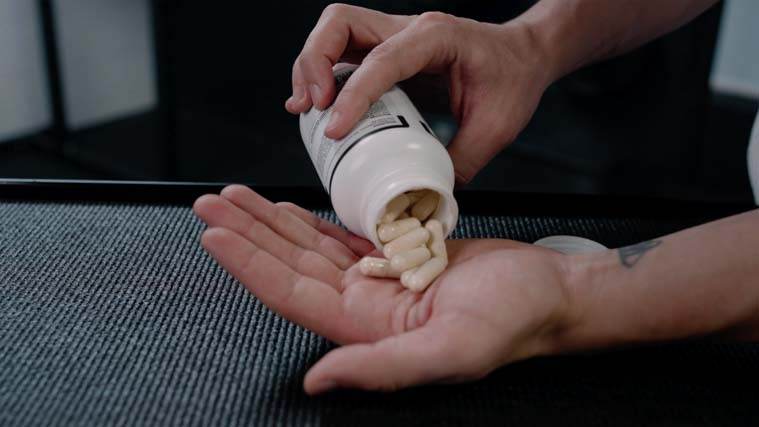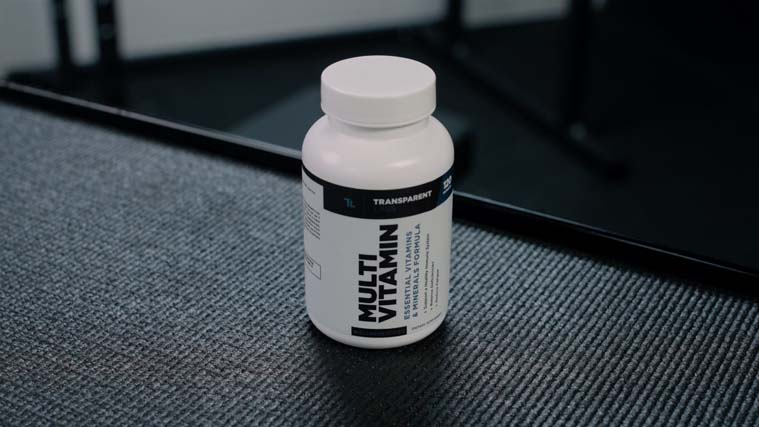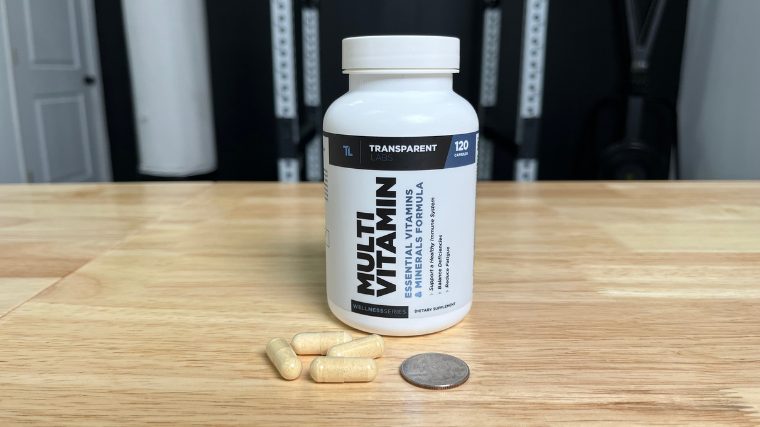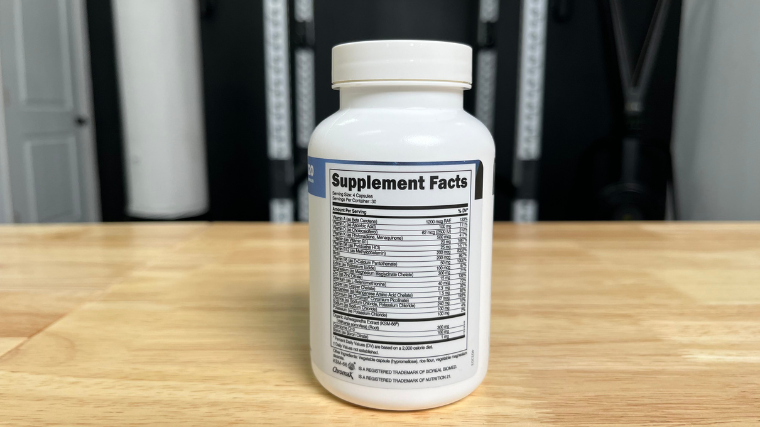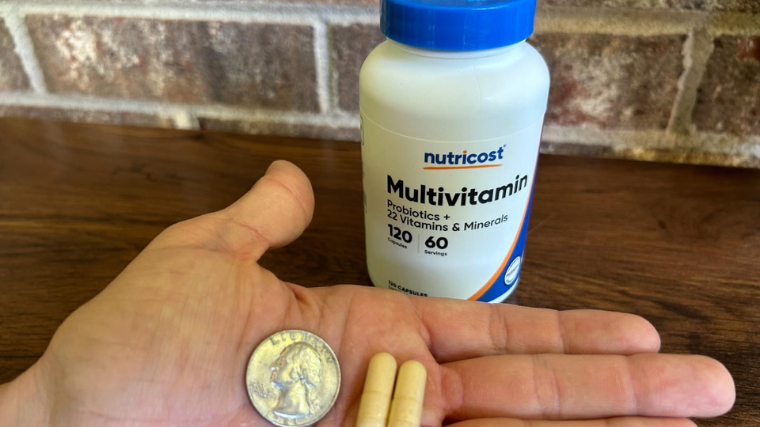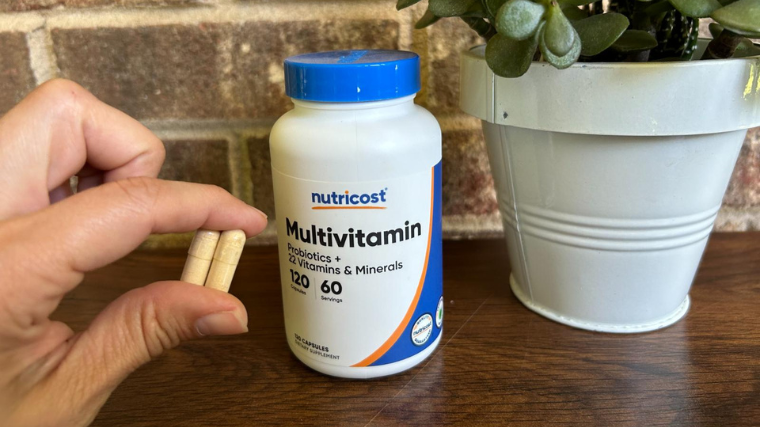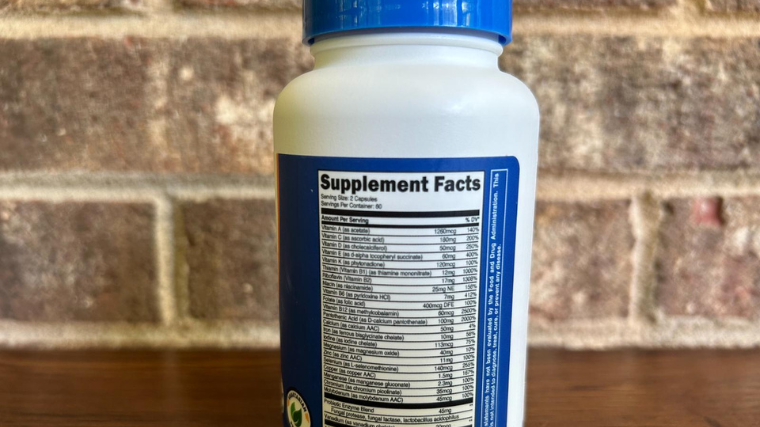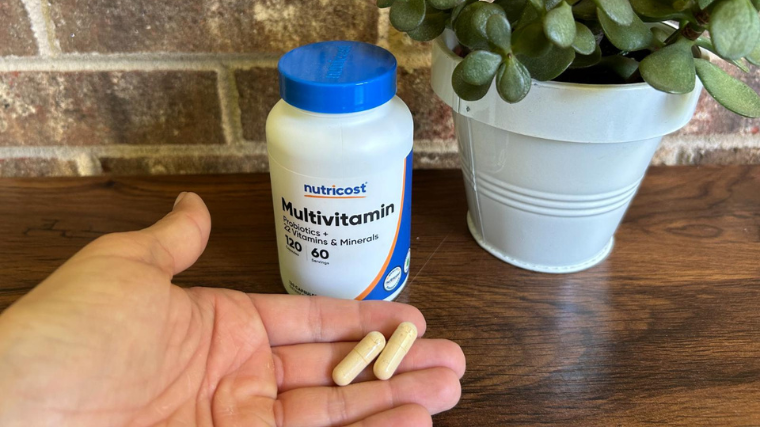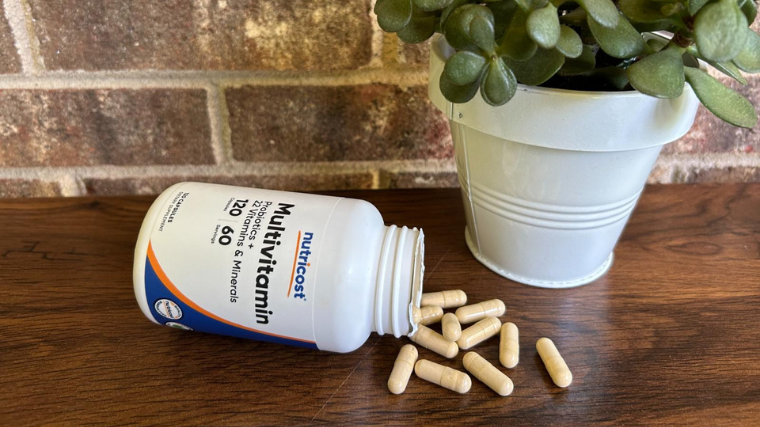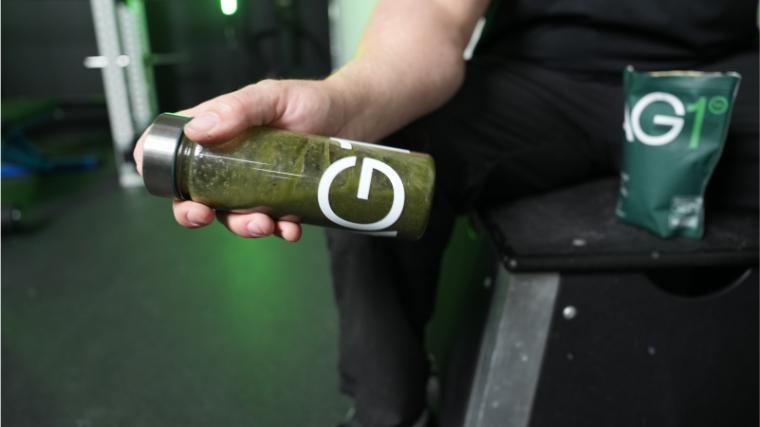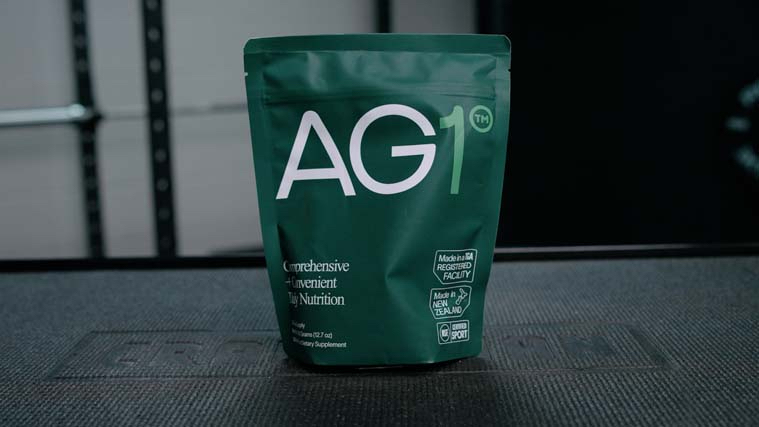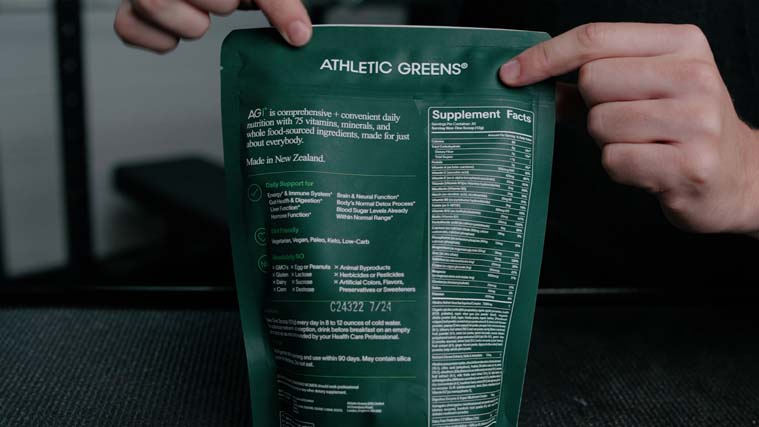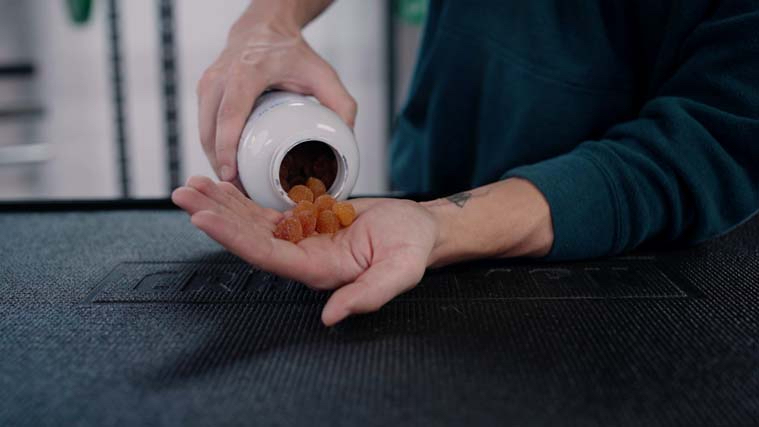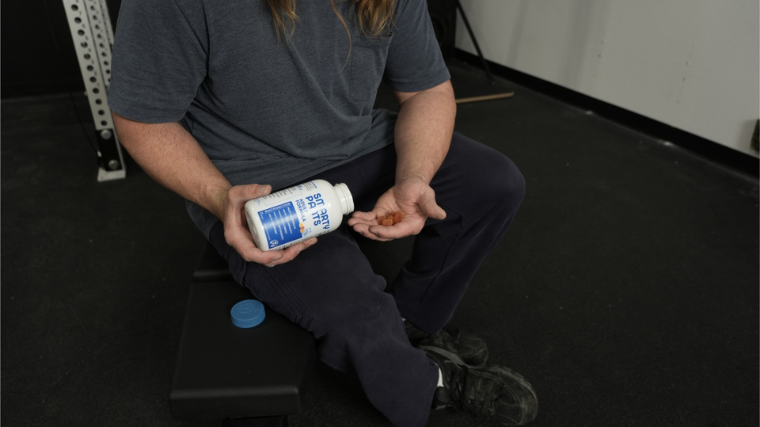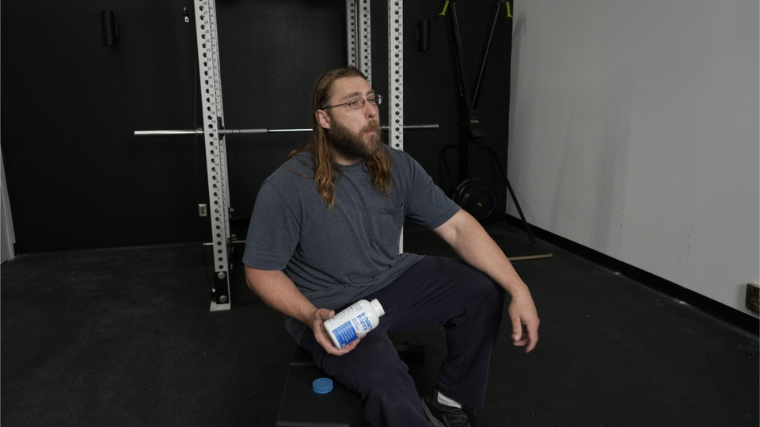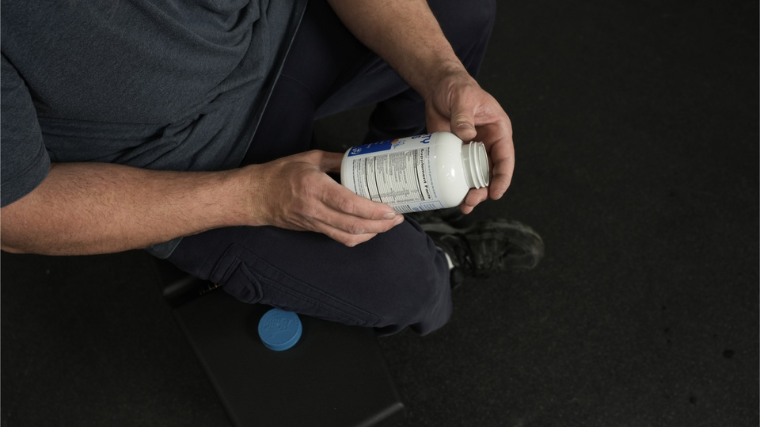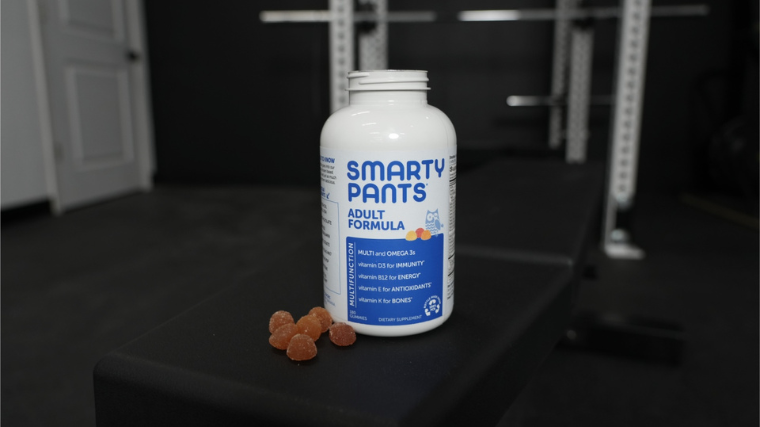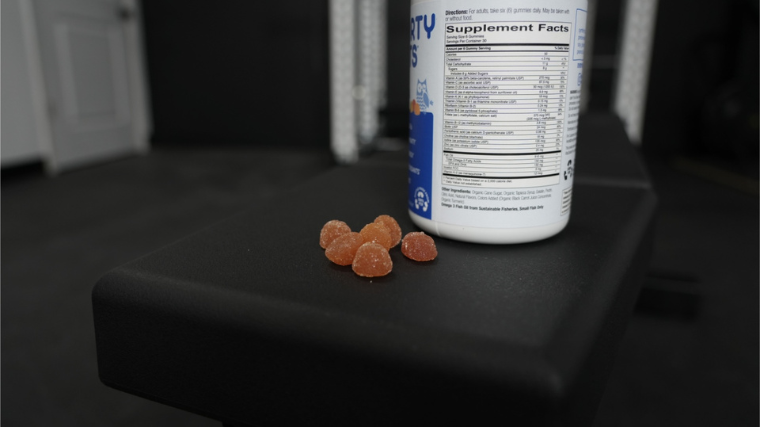Shopping to find the best multivitamins can be overwhelming, to say the least. With endless claims and different formula lists, it’s easy to wonder, “Am I just throwing my money away?” It’s a fair question. What isn’t in question is the importance of vitamins and minerals. Your body needs them to produce red blood cells, regulate brain and organ function, and repair wounds. Approximately 90% of Americans don’t eat enough fruits and veggies. As a result, about one-third of the U.S. population is at risk of being deficient in at least one vitamin. (1)
For women and anyone who menstruates, taking a women’s multivitamin can be used to address a variety of important health areas: boosting your iron intake, supporting joint and bone health…the list goes on. But you need to know what you’re getting in your vitamin supplement and why. To help you find the right multivitamin, we tried dozens of brands marketed to women — from the most popular to newer, lesser-known labels. In the end, we narrowed down the list of the best multivitamins for women (and people of any gender, really) to the top seven products out there.
The Best Multivitamins for Women of 2025
- Best Multivitamin for Women Overall: Transparent Labs Multivitamin
- Best Multivitamin for Younger Women: Nutricost Multivitamin
- Best Multivitamin for Women Over 50: Ritual Essential for Women Over 50
- Best Women’s Multivitamin With Iron: Legion Triumph for Women
- Best Women’s Multivitamin with Probiotics: AG1
- Best Women’s Multivitamin for Women’s Hair: OLLY Women’s Multi
- Best Gummy Multivitamin for Women: Smarty Pants Daily Organic Gummy
Editor’s note: The content on BarBend is meant to be informative in nature, but it should not be taken as medical advice. The opinions and articles on this site are not intended for use as diagnosis, prevention, and/or treatment of health problems. It’s always a good idea to talk to your doctor before beginning a new fitness, nutritional, and/or supplement routine. None of these supplements are meant to treat or cure any disease. If you feel you may be deficient in a particular nutrient or nutrients, please seek out a medical professional.
Best Multivitamins for Women Video Review
Take a closer look at our top picks for women’s multivitamins as former BarBend editor Nick English breaks down our reasoning and why each of these products made our master list.
How We Tested and Chose the Best Women’s Multivitamins
The BarBend team is comprised of competitive athletes, certified personal trainers, and lifelong fitness enthusiasts. Using the same rigorous standards and supplement testing methodology that we use to evaluate hundreds of supplements, we’ve tried dozens of multivitamins to land on this list of the best on the market. We’ve rated each profile on a scale of 1 (lowest) to 5 (highest). Here are some of the categories and considerations that impacted our rankings:
- Diversity of Nutrients in Multivitamins for Women: Since we are looking at multivitamins here, we wanted ingredient lists that were comprehensive. We haven’t selected many multivitamins that just have vitamins and minerals — some have enzymes, some have omega-3s, and some even have probiotics. It was important to us that the products we selected went beyond your typical vitamins and minerals ingredient list.
- Potency Support: You definitely don’t need a high dose of every nutrient — especially if you’re following a healthy diet and are already getting a lot of vitamins and minerals via whole foods. But we did make sure that the ingredients in our picks each came in proper dosing to supplement healthy diets.
- Interaction of Nutrients in Multivitamins: Some nutrients interact with each other, which also affects the dosage that certain ingredients should have. The Journal of the American College of Nutrition is one of many publications that found too much zinc in a multi can make it more difficult to absorb calcium. We made sure that the products we selected did not have ingredients interacting in this way. (14)
- Price: The best multivitamin in the world won’t do you much good if you can’t afford it. While there are certainly pricey options on our list, we’ve also made sure to include multivitamins that are easier to budget for to make them as accessible as possible. Don’t worry — if it’s on this list, you can rest assured that lower price doesn’t mean lower quality.
Best Multivitamin for Women Overall: Transparent Labs Multivitamin
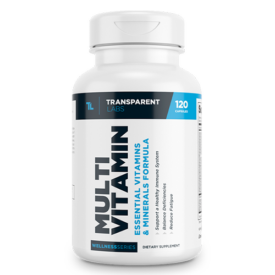
Transparent Labs Multivitamin is an advanced micronutrient complex that includes 23 minerals, vitamins, and adaptogens to bring you a full spectrum of micronutrients. This contains 100% or more of your daily needs for 11 of the established daily values, while four supplements are extra and don't have a basic daily value requirement.
Specs
- Key Ingredients: vitamin A, vitamin C, vitamin D, vitamin K, vitamin B1, vitamin B12, biotin, vitamin B, organic ashwagandha extract, coenzyme Q10
- Form: capsule
- Serving Size: 4 capsules
- Number of Servings: 30
- Price Per Serving: $1
- Certifications: Elite Manufacturing & Packaging Certificate of Composition
This pick has 28 vitamins and minerals — not only is this a robust list of ingredients, but this supplement also comes at a very reasonable price point.
Transparent Labs made a rather comprehensive formula for this multi with over 20 vitamins and minerals to help you stay on track with your micronutrient needs. Of those, 11 are over 100 percent of your recommended daily intake (RDI) with all of the vitamins — A, C, D, and K — as well as B vitamins with high doses between 111 and 8,333 percent of your RDI. The formula has one milligram of boron too — which may seem low but is within the desired range — and might be helpful in regulating hormone levels in women’s bodies. (16)
There are also some extras, like 300mg of ashwagandha to help relieve stress and potentially decrease inflammation. (17) What you won’t find in this multi is important too, namely any artificial sweeteners, coloring, or preservatives. This product is also suitable for vegetarians since the capsules are made from vegetable cellulose instead of gelatin. One major downside for some folks that are somewhat pill-averse is that you need to take four capsules to receive a full serving. If that’s not a problem, then you can pick this up for a reasonable price — around $29.99 ($1.00 per serving).
Transparent Labs is an all-natural multivitamin with high doses above your RDI for the majority of its vitamins and minerals. This product includes a few extra credit ingredients outside of a normal multivitamin, including the adaptogen ashwagandha, which may be helpful for mood support and anxiety, along with CoQ10, which can potentially help with heart health.
Best Multivitamin for Younger Women: Nutricost Multivitamin
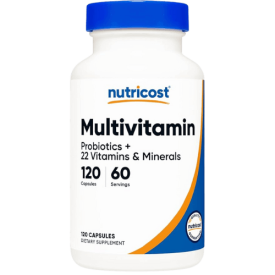
This cost-effective multivitamin features 60 servings per container, and costs just 25 cents per serving. Additionally, the formulation includes plenty of vital vitamins and minerals, with many doses beyond the recommended daily value to give you a fighting chance to replenish any deficiencies.
Specs
- Key Ingredients: vitamin A, vitamin C, vitamin D, vitamin E, vitamin K, thiamin (vitamin B1), riboflavin (vitamin B2), niacin, vitamin B6, folate, vitamin B12, calcium, iron, magnesium, zinc, copper, manganese, chromium, molybdenum, probiotic enzyme blend
- Form: capsules
- Serving Size: 2 capsules
- Number of Servings: 60
- Price Per Serving: $0.30
- Certifications: Manufactured in a NSF-Certified, CMP-Compliant, FDA-Registered Facility
If you’re on the younger end of the spectrum and want to make sure you’re getting everything you need in your busy lifestyle (which includes more on-the-go, veggie-free meals than you’d like to admit), the Nutricost Multivitamin with Probiotics can come in handy. It can swoop in to fill the gaps left by a busy lifestyle without a whole lot of time for balanced meals (though that is the goal).
Efficiency is key with Nutricost Multivitamin, and we’re not just talking price. Although, wait, let’s talk price: at just 30 cents per serving, you can fit this into a much tighter budget than our other options here. But we’re not shirking quality. According to our expert reviewer and registered dietitian Chelsea Rae Bourgeois, “The Nutricost Multivitamin with Probiotics meets 100% of your daily needs for many vitamins and minerals [except calcium and magnesium], and adds a probiotic enzyme blend to help support a healthy gut.”
You’ll have to take 2 capsules per serving to hit those daily needs, but according to our tester, that’s not a problem. “I took them both at the same time with a bit of water,” they say, comparing the size of each capsule to something smaller than a quarter but a bit longer than a nickel. “You know the taste of a vitamin when you have one,” they explain. “This tastes…vitamin-y. But not bad, by any means.”
Each bottle comes with 60 servings, which is nothing to scoff at. The biggest drawback here lies in the probiotics part of the multivitamin. It’s great that they’re included, and definitely can make this product more desirable. But you won’t know how much of which probiotic you’re getting. “Unfortunately, the probiotic enzymes in the Nutricost Multivitamin are part of a proprietary blend,” Bourgeois explains. “You can’t be sure how much of each strain you’re consuming.”
Overall, the formula still holds up pretty well. “The Nutricost Multivitamin with Probiotics scores a 4 out of 5 for its formulation. It contains an impressive amount of essential vitamins and minerals, but the probiotics may not compare to a true probiotic supplement.”
Best Multivitamin for Women Over 50: Ritual Essential for Women 50+
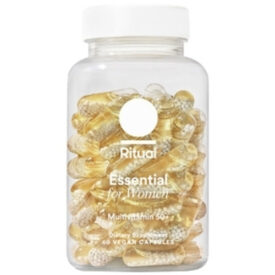
A subscription-based multivitamin with transparent ingredient sourcing, easy-to-take capsules, and a formula specifically designed for women over 50 years old.
Specs
- Key Ingredients: vitamin D3. vitamin E, folate, vitamin B12, magnesium, 0.7mg boron, omega-3 acid, vitamin K2
- Form: capsules
- Serving Size: 2 capsules
- Number of Servings: 30
- Price Per Serving: $1.30
- Certifications: Informed Protein, Informed Sport, Certified B Corporation
For women over 50, you may want to look for a multivitamin that increases energy, supports bone health, and promotes immune function — this pick is that vitamin.
Ritual has crafted a formula specific to women over 50 years old. It contains eight ingredients — including vitamin D, K2, E, B12, folate, omega-3, boron, and magnesium — in particular doses. Ritual packs its formulas with a lot of vitamins and minerals in high doses.

They purposely leave out specific ingredients — vitamin C and calcium in this case, as women in this category most likely get enough of those two. Any more is unnecessary. A nutrient-dense diet should be your main priority, but a supplement can offer a little extra support. The focus of this formula is heart health, immune function, bone support, and muscle function, and the label reflects that.
If you’re over 50 and want a vitamin supplement with a streamlined formula that caters specifically to women in your age group, Ritual’s 50+ formula is your best bet.
Read our full Ritual Essential Vitamin for Women Review.
Best Women’s Multivitamin With Iron: Legion Triumph for Women
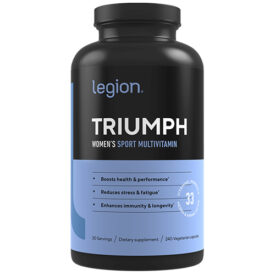
Legion Triumph includes 10mg of iron per serving, which is 60 percent of your RDI. On top of that, you’ll find 22 key vitamins and minerals, like vitamin A, C, D, and E, vitamins K1 and K2, B vitamins, as well as calcium, magnesium, biotin, zinc, and iron.
Specs
- Key Ingredients: vitamin C, vitamin D, vitamin K1, vitamin K2, vitamin B1, vitamin B2, vitamin B3, vitamin B5, vitamin B6, vitamin B12
- Form: capsule
- Serving Size: 8 capsules
- Number of Servings: 30
- Price Per Serving: $1.63
- Certifications: Third-party tested (not specified)
Whether you’re working through a tough training schedule or just seem to be hitting a lull in the afternoon, a multivitamin with plenty of B vitamins may help increase your energy levels.
Insufficient levels of B vitamins may contribute to mental fog and fatigue. (18) Luckily, this formula has more than 100 percent of your daily intake of vitamins B1, B2, B3, B5, B6, and B12.
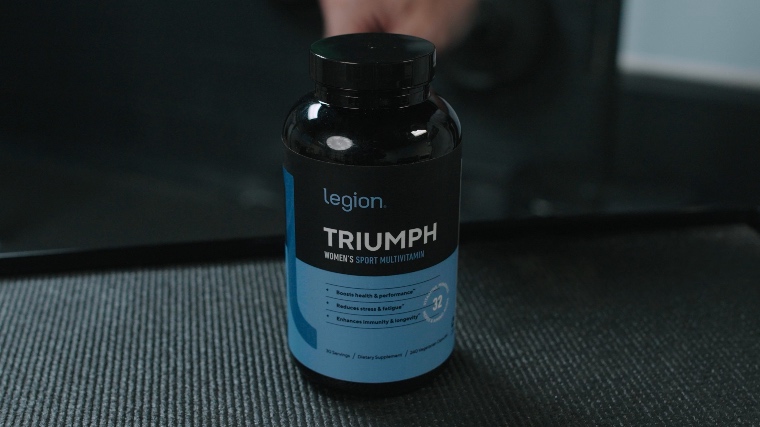
In addition to these energy-boosting ingredients, Legion contains a pretty comprehensive list of vitamins and minerals — 22 to be exact — which include vitamins A, C, D, and E, vitamins K1 and K2, biotin, calcium, magnesium, zinc, and iron. A downside of this supplement, however, is that for the full dose, you do have to consume eight capsules daily, which can be a lot for some.
Legion Triumph MultivitaminWhile Legion Triumph may be a little more expensive than some other multivitamins, this supplement contains 22 key vitamins and minerals, including vitamin B12 and CoQ10, which may help with energy.
Best Women’s Multivitamin with Probiotics: AG1
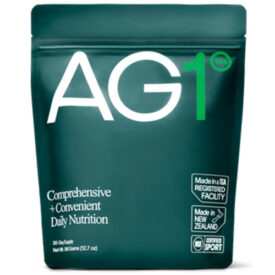
Specs
- Key Ingredients: vitamin A, vitamin C, vitamin E, thiamin, riboflavin, niacin, vitamin B6, vitamin B12, dairy-free probiotic
- Form: powder
- Serving Size: 1 scoop
- Number of Servings: 30
- Price Per Serving: $2.63
- Certifications: NSF Sport Certified
In the debate between greens powders vs. multivitamins, some may want a multivitamin that includes probiotics to help with gut health. “AG1 Athletic Greens provide a concentrated source of nutrients, along with beneficial probiotics,” explains registered dietitian Chelsea Rae Bourgeois. “And since the research behind greens powders is lacking, I like that this product is third-party tested for safety.”
AG1 is a multifaceted greens supplement. It contains 75 minerals, vitamins, whole foods, and of course, pre- and probiotics in each one-scoop serving. What makes the probiotics so special in this formula is that they’re also paired with prebiotic, inulin, which is a fiber that may help feed probiotics and enhance their presence in the body to help improve gut health. (2) This formula also contains 7.2 billion units of dairy-free probiotics in the form of lactobacillus acidophilus and bifidobacterium bifidum — two strains of probiotics.
This formula is a high-quality greens powder that doesn’t contain any gluten, added sugar, eggs, peanuts, or dairy, so it is an excellent choice for those who have any sensitivities or allergies to those ingredients. A major fear for some in regards to greens powder is the taste, and AG1 is naturally flavored with vanilla and pineapple flavor and picks up some subtle hints from other fruits and veggies in the mix like cherry, broccoli, and stevia.
A one-month supply of AG1 will cost you around $2.63 per day, which is more expensive than other multivitamins. And, “Unfortunately, AG1 Athletic Greens is packed with proprietary blends, so you don’t really even know what you’re spending your money on,” Bourgeois points out.
Overall, Bourgeois awards this blend a 3 out of 5 for its formulation, “with major deductions for its proprietary blends and cost. For many, the cost doesn’t match the purported benefits.” That said, if you can afford it, you may prefer to get your vitamins from food (albeit powdered) rather than a pill.
Read our full Athletic Greens Review.
Best Women’s Multivitamin for Women’s Hair: OLLY Women’s Multi
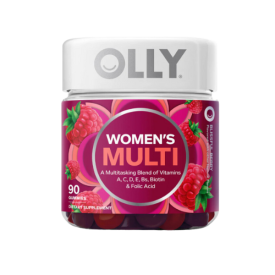
OLLY Women's Multi boasts 500% of your daily biotin needs, along with more than enough B12, iodine, vitamin D, and vitamin E to get you through your day. Plus, these are chewable gummies, so you won't have to worry about swallowing capsules.
Specs
- Key Ingredients: vitamin A, vitamin C, vitamin D, vitamin E, niacin, vitamin B6, folate, vitamin B12, biotin, iodine, zinc, selenium, chromium, sodium, boron
- Form: gummy
- Serving Size: 2 gummies
- Number of Servings: 45 or 65
- Price Per Serving: $0.28 (65-serving bottle) or $0.31 (45-serving bottle)
- Certifications: NSF, Certified B Corp
If one of your biggest aims in searching for a multivitamin is to take great care of your locks, you’ll want a multi that comes with biotin. Why? It’s a B vitamin that has been shown to help boost hair (not to mention skin and nail) health. (3)(4) And not all multivitamins have it. But OLLY Women’s Multi comes packed with 150 micrograms of the stuff — that’s 500 (yes, 500) percent of your daily value — rendering it the best multivitamin for women’s hair.
You’ll have to take two gummies per serving (and no, OLLY Women’s Multi isn’t available in another form), but it won’t cost you much to get there. If you opt for the 45-serving bottle, you’ll pay just 31 cents per serving. Spring for the 65-serving container, and you’ll spend just over a single quarter per serving (28 cents). Who knew hair care could come at such a solid bargain?
But a word to the vegans and vegetarians out there who are after great hair health — OLLY won’t be the one for you. It’s made with gelatin, so it’s not vegan or vegetarian-friendly. It’s also got glucose syrup and straight-up sugar, which makes for a nice snack but might pack in a little more sugar than you had planned for the day.
But if you do eat animal products (and don’t mind the sugar), the gelatin gives the whole thing a great texture, our testers say. “This goes down so easily,” one of our testers says. And don’t worry — it’s not sticky. “Like your average gummy, it’s chewable, but this one won’t stick to your teeth like some others do. At least, it didn’t stick to mine.”
If you’re caring for your hair on the move (when are we not?), our testers recommend avoiding leaving these in a hot car or any other place that gets toasty. “They melt together pretty readily,” they explain. “They’re so easy to swallow because they don’t have a coating that keeps them separated, so they can kind of congeal if they get too warm. Their texture isn’t bad at all, but they are pretty soft as far as gummies go.”
Best Women’s Multivitamin Gummy: Smarty Pants Daily Organic Gummy
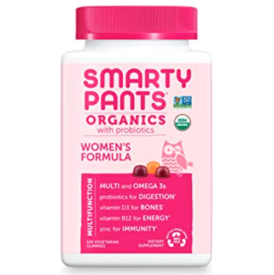
Smarty Pants Daily Gummies contains 10mg of Bacillus subtilis probiotics that have a 99 percent survivability rate. It also contains vitamins and minerals like vitamin B12, vitamins A,C,D and E, folate, omega-3, biotin, and zinc.
Specs
- Key Ingredients: vitamin A, vitamin C, vitamin D, vitamin E, vitamin B6, folate, vitamin B12, biotin, bacillus subtilis
- Form: gummy
- Serving Size: 4 gummies
- Number of Servings: 30
- Price Per Serving: $1.23
- Certifications: USDA Organic, Clean Label Project Purity Award, Non-GMO Project Verified
If you’re looking to add a little flavor to your daily multivitamin, a gummy supplement is a great way to go. This gummy multi is one of the best we’ve tried.
The Smarty Pants Daily Organic Gummy packs 15 essential nutrients — including omega-3’s, vitamin D3, vitamin C, and vitamin B12 — into one four-gummy serving. In addition, this supplement contains biotin, which may help with hair, skin, and nail health, a benefit many women take a separate supplement for already. Another bonus is that these are USDA-certified organic, rendering them among the best organic multivitamins for women, too.
Smarty Pants also includes zinc, which may help with immune support. This product is certified organic and vegetarian and comes in a 120-gummy bottle of multiple fruity flavors.
Smarty Pants Daily Organic Gummies are comprehensive and great tasting — though you do have to take four gummies per serving, which may be a lot for some to chew.
Benefits of Women’s Multivitamins
While different companies take different approaches to gender-specific nutrition, many multivitamins for women emphasize ingredients like biotin and collagen, which may help hair and nail health.
You can also expect to find more iron, vitamins C, E, and K, as well as calcium and magnesium in multis made for women. Below, we break down the benefits of each component:
- Biotin: Biotin is a B vitamin that has been shown to improve hair and skin health, as well as your nails, according to a Swiss study published in Cutis. (3)(4)
- Zinc: Zinc plays a crucial role in healthy cell division, and because our nails grow quickly, signs of deficiency make themselves known on your nails quicker than in any other areas. Zinc may also help with protein synthesis, which means it could help athletes recover faster. (5)(6)
- Vitamin A: Vitamin A is an antioxidant that has been shown to protect the body against free radicals. (7)
- Folic Acid: Whether you’re growing out your nails, promoting mental health, or looking to fight inflammation, this B vitamin can provide some major assistance. (8)
- Vitamin C: Also known as ascorbic acid, this vitamin is best known for boosting the immune system. (9) But it also helps in the production of collagen and wound healing. (10) Because our bodies cannot store Vitamin C, we need to get it either through food or supplementation regularly.
- Vitamin D: Vitamin D is involved in many bodily processes, including building proteins and enzymes, boosting the immune system, and fighting inflammation. It’s also good for bone health, which is why folks over 50 may want to pay extra attention to this one. Because it’s tricky to get the right amount from food, most people have to get the rest of their daily needs through sun exposure and supplementation.
- Vitamin E: Vitamin E is an antioxidant that may help prevent damage to the body’s cells. It’s also essential for the functional and structural maintenance of cardiac, skeletal, and smooth muscle tissue.
- Vitamin K: Vitamin K can help reduce inflammatory markers; research shows that it may help protect against heart disease, as well as osteoporosis. (11)
- Omega-3 Fatty Acids: You may already try to seek out omega-3 benefits with your food choices (cue: avocado toast and salmon sushi), but according to research, more than 70 percent of women don’t get enough omega-3s in their diet. This can be problematic because they may promote a more robust immune system, and support cardiovascular, joint, and vision health.
- Iron: Since people who menstruate are more likely to be iron-deficient than people who don’t — especially at different points in the menstrual cycle — having a multivitamin that includes a dose of iron can be particularly helpful. Some of the potential benefits of having iron in a multivitamin include increased energy, better brain function, and healthy red blood cells.
- Collagen: Collagen is a protein found in the connective tissue in our bodies, which means it’s in our skin, hair, muscles, bones, and even blood vessels. This ingredient may help women reduce the appearance of cellulite and improve skin hydration. (12)
- Magnesium: Magnesium is important for many processes in the body, such as regulating muscle and nerve function, blood sugar levels, and blood pressure, as well as building protein, bone, and even DNA.
- Calcium: Vegan people in particular should be on the lookout for bone-boosting calcium in their multivitamins because they won’t be getting it from the most common source: dairy.
- Coenzyme Q10: We consider CoQ10 a bonus ingredient anytime it shows up in a multi. It’s an antioxidant that’s found in every cell of the body. Your body makes CoQ10, and your cells use it to produce the energy your body needs for cell growth and maintenance. Because levels of it decrease as we age, some seek supplementation.
- Alpha-Lipoic Acid: Alpha-lipoic acid is an antioxidant, found in every cell in the body, that may help manage inflammation. We naturally produce ALA in our body, but like collagen, our levels decrease as we age. So whenever we see it in a multivitamin, we’re especially amped for older women.
[Read More: The Best Supplement Stacks, R.D.-Reviewed]
How Much Do the Best Multivitamins for Women Cost?
As you pick and choose your favorite picks from this list, here’s an easy table to compare prices across different brands and products. We’ll get right to the “meat” of it: the cost per serving.
| Best Multivitamin for Women Overall | Transparent Labs Multivitamin | $1.00 |
| Best Multivitamin for Younger Women | Nutricost Multivitamin | $0.30 |
| Best Multivitamin for Women Over 50 | Ritual Essential for Women Over 50 | $1.30 |
| Best Women’s Multivitamin with Iron | Legion Triumph for Women | $1.33 |
| Best Women’s Multivitamin With Probiotics | AG1 | $2.63 |
| Best Women’s Multivitamin for Women’s Hair | OLLY Women’s Multi | $0.28 |
| Best Gummy Multivitamin for Women | Smarty Pants Daily Organic Gummy | $1.23 |
What to Consider Before Buying A Women’s Multivitamin
Let’s be real: generally speaking, you’ll be searching for the same kinds of things in the best vitamins for women as you will be in the best multivitamins for men (and folks of any gender) — high-quality, well-reputed sources with rigorous third-party testing, and scientifically-backed doses.
And since there are so many ingredients within multivitamins, you’ll want to consider the ingredients you’re looking for, your preferred form, and the price you’re willing to pay before deciding which supplement to buy.
Want a personalized approach to vitamins? Read our full Care/of Vitamins Review.
Ingredients and Dosage
The ingredients in multivitamins can vary quite a bit, so if you’re looking for a specific vitamin or mineral, it’s going to be important for you to check the label before you decide which supplement to buy. In addition, you’ll want to make sure your vitamins and minerals are coming in your desired dosages. Many multis can offer over 100% of your RDI for some ingredients, and if you’re looking to avoid those amounts, reading each label thoroughly is going to be key.
It’s also important to note that many of these multivitamins contain blends of vitamins and minerals. The labels don’t necessarily list out exactly what’s in each of these blends. While that may not be an issue for some, if you’re concerned about exact dosages, keep an eye on those labels for proprietary blends.
For athletes, check out our Optimum Nutrition Opti-Women Multivitamin Review.
Form
While no form is inherently better than the other, you’ll still want to consider your personal preference before buying — do you prefer capsule, gummy, or powder multivitamins? For example, if you’re always on the go, a capsule might be easiest to travel with. On the other hand, a powder mixed in water may be easier to digest for some women. Make sure to weigh all the pros and cons before deciding.
Searching for more softgels or gummies? Check out our NOW Eve Softgels Women’s Multi-Vitamin Review.
Price
Prices can vary with multivitamins because their ingredients vary so much. If your multi has an extensive ingredient list, you can expect it to be more expensive. If you’re opting for a personalized multivitamin, you can also expect to be dishing out a little more cash. Decide on your price point before you start sifting through options.
Best Women’s Multivitamins FAQs
Do I even need to take a multivitamin?
Probably. Even with a “perfect” diet, many things (like stress, sleep schedule, and even the storage and transportation of food) make it tough for you to get the nutrients you need solely from the foods you eat. By incorporating a vitamin supplement into your diet, you may be able to fill the gaps on your plate. Still, even while you’re incorporating the best daily vitamins for women into your routine, make sure you’re getting those actual fruits and veggies in.
Are some vitamins more important for women?
Generally, people of all genders have the same recommended intake of vitamins and minerals. However, cis men and cis women have different risks for certain ailments (research on trans and nonbinary-specific nutrition is still limited). That’s why it’s often emphasized that cis women, people taking estrogen, or people assigned female at birth should make sure they consume sufficient amounts of calcium, iron, vitamin K, vitamin D, and folate.
What vitamins should a woman take on a daily basis?
Ideally, we’d consume all of the vitamins and minerals we’re meant to in a day. The ones women (and really, most people) should focus on, however, are the ones that they tend to not meet the recommended intake: magnesium, potassium, Vitamin D, calcium, Vitamin A, vitamin C, and Vitamin E. So what is the best multivitamin for women? Something that can meet your unique needs with all of the above if possible.
What vitamins do postmenopausal women need more of?
Calcium needs appear to increase after menopause, as bone loss may accelerate. On a similar note, postmenopausal women should try to meet their needs for Vitamin D, Vitamin K, and magnesium, which all contribute to bone health. Folate, often associated with pregnancy, is also important as it’s cardioprotective.
What is the best multivitamin for women?
Women have different needs than men physiologically and their supplements should reflect those distinct requirements. Transparent Labs made their formula with over 20 well-dosed ingredients — more than half are over 100 percent of your daily needs. There are also a few nice extras, like CoQ10 for potential heart health and ashwagandha, which may aid in mood support, making it our favorite option right now.
What is the best multivitamin for pregnant women?
Although we think Transparent Labs’ Multivitamin is the best all-around women’s pick, pregnant women may need a different formula. Different women have different vitamin and mineral needs during pregnancy, so it’s best to consult your healthcare provider before trying a new multivitamin supplement.
References
- Bird JK, Murphy RA, Ciappio ED, McBurney MI. Risk of Deficiency in Multiple Concurrent Micronutrients in Children and Adults in the United States. Nutrients. 2017;9(7):655. Published 2017 Jun 24. doi:10.3390/nu9070655
- Kelly G. Inulin-type prebiotics–a review: part 1. Altern Med Rev. 2008 Dec;13(4):315-29. PMID: 19152479.
- Tardy AL, Pouteau E, Marquez D, Yilmaz C, Scholey A. Vitamins and Minerals for Energy, Fatigue and Cognition: A Narrative Review of the Biochemical and Clinical Evidence. Nutrients. 2020 Jan 16;12(1):228. doi: 10.3390/nu12010228. PMID: 31963141; PMCID: PMC7019700.
- Glynis A. A Double-blind, Placebo-controlled Study Evaluating the Efficacy of an Oral Supplement in Women with Self-perceived Thinning Hair. J Clin Aesthet Dermatol. 2012 Nov;5(11):28-34. PMID: 23198010; PMCID: PMC3509882.
- Hochman LG, et al. Brittle nails: response to daily biotin supplementation. Cutis. 1993 Apr;51(4):303-5.
- Scheinfeld N, Dahdah MJ, Scher R. Vitamins and minerals: their role in nail health and disease. J Drugs Dermatol. 2007 Aug;6(8):782-7. PMID: 17763607.
- Cashman MW, et al. Nutrition and nail disease. Clin Dermatol. 2010 Jul-Aug;28(4):420-5. Palace VP, et al. Antioxidant potentials of vitamin A and carotenoids and their relevance to heart disease. Free Radic Biol Med. 1999 Mar;26(5-6):746-61.
- Palace VP, Khaper N, Qin Q, Singal PK. Antioxidant potentials of vitamin A and carotenoids and their relevance to heart disease. Free Radic Biol Med. 1999 Mar;26(5-6):746-61. doi: 10.1016/s0891-5849(98)00266-4. PMID: 10218665.
- Valentini L, Pinto A, Bourdel-Marchasson I, Ostan R, Brigidi P, Turroni S, Hrelia S, Hrelia P, Bereswill S, Fischer A, Leoncini E, Malaguti M, Blanc-Bisson C, Durrieu J, Spazzafumo L, Buccolini F, Pryen F, Donini LM, Franceschi C, Lochs H. Impact of personalized diet and probiotic supplementation on inflammation, nutritional parameters and intestinal microbiota – Thse “RISTOMED project”: Randomized controlled trial in healthy older people. Clin Nutr. 2015 Aug;34(4):593-602. doi: 10.1016/j.clnu.2014.09.023. Epub 2014 Oct 8. PMID: 25453395.
- Douglas RM, et al. Vitamin C for preventing and treating the common cold. Cochrane Database Syst Rev. 2004 Oct 18;(4):CD000980.
- Ringsdorf WM Jr, et al. Vitamin C and human wound healing. Oral Surg Oral Med Oral Pathol. 1982 Mar;53(3):231-6.
- Pearson DA. Bone health and osteoporosis: the role of vitamin K and potential antagonism by anticoagulants. Nutr Clin Pract. 2007 Oct;22(5):517-44.
- Schunck M, et al. Dietary Supplementation with Specific Collagen Peptides Has a Body Mass Index-Dependent Beneficial Effect on Cellulite Morphology. J Med Food. 2015 Dec;18(12):134
- Brissette, Christy. “Perspective | Morning or Night? with Food or without? Answers to Your Questions about Taking Supplements.” The Washington Post, WP Company, 5 Feb. 2019, https://www.washingtonpost.com/lifestyle/wellness/morning-or-night-with-food-or-without-answers-to-your-questions-about-taking-supplements/2019/02/04/5fcec02a-2577-11e9-81fd-b7b05d5bed90_story.html.
- Spencer H, Rubio N, Kramer L, Norris C, Osis D. Effect of zinc supplements on the intestinal absorption of calcium. J Am Coll Nutr. 1987 Feb;6(1):47-51. doi: 10.1080/07315724.1987.10720165. PMID: 3584729.
